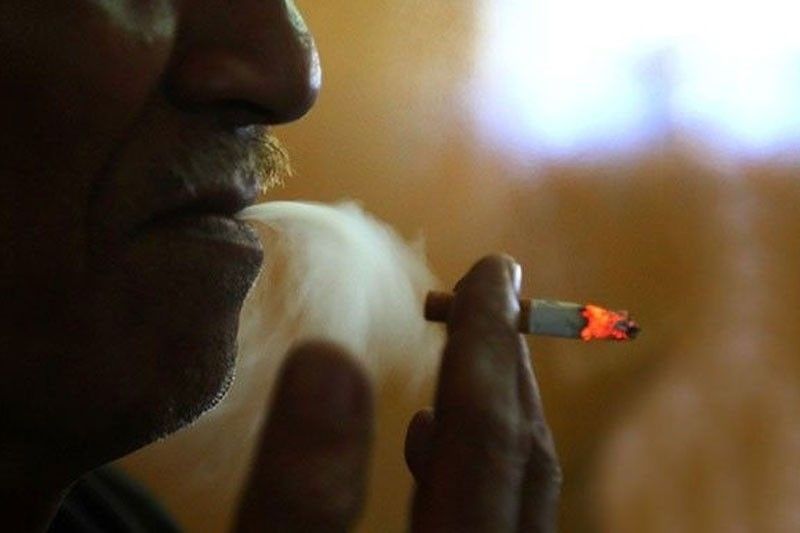Only 4% quit smoking amid Philippines regulations

MANILA, Philippines — A low four percent of the country’s smoking population are quitting the habit despite government regulations on tobacco products to arrest its harmful impact on public health.
Latest records released by the Philippine Statistics Authority (PSA) and the Department of Health (DOH) showed that only about 640,000 out of the country’s 15.9 million smokers have kicked the habit.
This data, obtained by The STAR, was submitted to the House committee on trade and industry for consideration in hearing bills seeking regulation of e-cigarettes and vapes that will resume on Tuesday.
Since 2016, the Duterte administration has been aggressive in implementing regulatory measures that discourage nicotine addiction, such as the ban on smoking in public and the high excise tax on tobacco.
But statistics showed 12 million or 76 percent of tobacco smokers in the country are merely planning to quit lighting up. This implies that regulatory measures on tobacco might have failed in achieving their purpose.
To address this gap, experts urged lawmakers to loosen up on the use of electronic nicotine delivery system (ENDS) products to effectively cut the number of tobacco smokers by giving them an alternative.
They submitted to the House panel a recent independent global survey suggesting to regulators to consider open science and facts-driven policies regarding smoke-free alternatives to cigarettes.
The research survey, titled “Unsmoke Your Mind: Pragmatic Answers to Tough Questions for a Smoke-Free Future,” was conducted by the international polling firm Povaddo among 17,251 adults aged 21-74 across 14 countries.
Nearly nine in 10 survey respondents or 87 percent agreed that “when developing regulations, governments, regulators and public health bodies should consider the current science relating to e-cigarettes and heat-not-burn tobacco products.”
With these findings, Philip Morris International Inc. (PMI) chief operating officer Jacek Olczak urged governments to base decision-making on science and facts.
WHO vs e-cigarettes
However, the World Health Organization (WHO) recommends that countries should have regulatory measures against all types of e-cigarettes, citing “growing evidence” that they can cause lung damage.
In a report, WHO said electronic cigarettes, known collectively as electronic nicotine delivery systems (ENDS), “are harmful to health and, where they are not banned, they must be regulated.”
“There is no doubt that they are harmful to health and are not safe, but it is too early to provide a clear answer on the long-term impact of using them or being exposed to them,” it said.
Citing reports of the United States’ Center for Disease Control and Prevention on Dec. 10, 2019, WHO claimed there were over 2,409 people hospitalized due to ENDS. There were 52 confirmed deaths.
“There are many different types of ENDS with varying amounts of nicotine and harmful emissions,” the agency noted.
WHO added at least five other countries have initiated investigations to identify cases of lung injuries related to ENDS use.
At present, ENDS is banned in over 30 countries worldwide, “with more and more countries considering bans to protect young people.”
New law
Last Jan. 22, President Duterte signed into law Republic Act 11467, which raises taxes on alcohol beverages and e-cigarettes.
Health advocacy groups the Southeast Asia Tobacco Control Alliance (SEATCA) and the Sin Tax Coalition welcomed the enactment of the new law, saying it would help protect Filipinos, especially the youth and the poor, against the harmful effects of these products.
“E-cigarettes and heated tobacco products are harmful, promote youth addiction and reduce the success of smokers wanting to quit their addiction. New taxes on these products are a win for the health of all Filipinos, particularly the youth,” noted SEATCA executive director Ulysses Dorotheo.
Based on the 2018 National Nutrition Survey, 20 percent of e-cigarette users in the Philippines are aged 10 to 19 years old. This proportion of youth e-cigarette smokers is three times higher than the proportion of youth cigarette smokers.?But Dorotheo underscored that “while the new tax rates are certainly higher than rates approved by the previous Congress, they should be raised further to at least the same level as traditional cigarettes.”
He added the tobacco epidemic claims around 117,000 lives annually in the Philippines and over eight billion lives globally.
For his part, Sin Tax Coalition co-convenor Anthony Leachon said the law is an effective measure because sin taxes “are an effective tool in discouraging the consumption of harmful products such as alcohol and tobacco.”
Leachon added the revenue generated from the sin tax increase will also help augment the funding for the Universal Health Care (UHC) law’s implementation.
Meanwhile, a House panel is set to resume hearing on 15 bills for regulation of ENDS on Tuesday with more experts expected to share best practices on ENDS regulations.
Following the enactment of RA 11467, which also mandates certain regulations on e-cigarettes, proposed measures introduced in the House will still be discussed Tuesday. It is unclear whether or not they will be amendatory to the new law or an entirely separate act altogether.
RA 11467 had put ENDS under the regulatory power of the Food and Drugs Administration (FDA); set minimum age for use of vapes at 22 years old and banned flavored products while only allowing plain tobacco and menthol.
The law’s main feature provides the raising of taxes on heated tobacco products by P25 in 2021; P27.50 in 2022; P30 in 2023; P32.50 in 2024 and by five percent every year thereafter.
The tax for freebased nicotine base will increase to P45 in 2021; P50 in 2022; P55 in 2023, P60 in 2024, with five percent annual increases onwards
The salt-based nicotine vape will be taxed slightly lower at P37 in 2021; P42 in 2022; P47 in 2023 and P52 in 2024, with five percent annual increases from 2025 and succeeding years.
- Latest
- Trending































